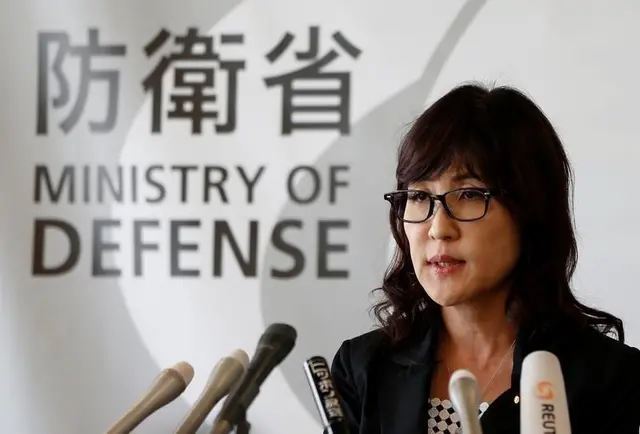Japanese Prime Minister Shinzo Abe on Friday said Defense Minister Tomomi Inada had submitted her resignation to account for a scandal involving the coverup of logs that recorded the daily activities of Japanese Ground Self-Defense Force troops serving as U.N. peacekeepers in South Sudan.
Inada's duties as defense minister will be taken over by Foreign Minister Fumio Kishida in the meantime until the appointment of a new defense chief. Her resignation comes ahead of a planned Cabinet reshuffle by the prime minister next week.
Tomomi Inada, the departing minister of defense, leaving the ministry in Tokyo on Friday.
Sources close to the matter said Friday that amid diminishing public trust in the Defense Ministry and the Self-Defense Forces, Abe is looking to replace Inada with someone with experience, with Itsunori Onodera's name being floated as her likely successor.
Abe first named Itsunori Onodera as defense minister in December, 2012.
Inada's resignation follows allegations that senior members of the Defense Ministry and top brass from the Ground Self-Defense Forces had knowledge of controversial mission logs containing the daily activities of troops deployed to South Sudan on a U.N. peacekeeping mission.
The logs, which showed the security situation where the troops had been deployed was deteriorating, were said by the Defense Ministry to have been discarded by members of the GSDF. The ministry later said that a digital version of the logs had been found.
Under intense media, public and political scrutiny over the coverup scandal, Inada's resignation to account for the alleged coverup has vehemently been called for by opposition parties, who suspect she knew the logs existed all along.
Senior SDF officials allegedly also knew at the time that the GSDF still had the data and government sources have claimed Inada had herself approved the coverup.
The Defense Ministry initially said in December last year that the mission logs from July detailing the increasingly severe situation for the Japanese troops, had been discarded by GSDF members. The Defense Ministry in February, in a volte-face, said it had found the logs in digital format on a computer belonging to the Self-Defense Forces Joint Staff Office.
But the ministry, at this juncture, still falsely claimed that the GSDF had discarded the same data. The descriptions in the controversial logs would have certainly seen the Japanese troops withdrawn from the area in South Sudan as the troops could have become caught up in fighting there, which would not only endanger their lives, but also contravene the nation's pacifist Constitution.
When Japan did finally pull its GSDF troops from the U.N. mission at the end of May this year, it said it was because the troops' activities had produced notable results during their five-year placement.
The government here made no mention of the troops being pulled because of the rapidly deteriorating security situation in South Sudan.
Inada has denied the allegations being levied at her and following a probe into the situation by the Defense Ministry, the ministry also denied on Friday that Inada had played a role in concealing the data.
Inada, a layer-turned-politician and close ally of the prime minister became defense minister in a Cabinet reshuffle in August last year.
(ASIA PACIFIC DAILY)
 简体中文
简体中文

